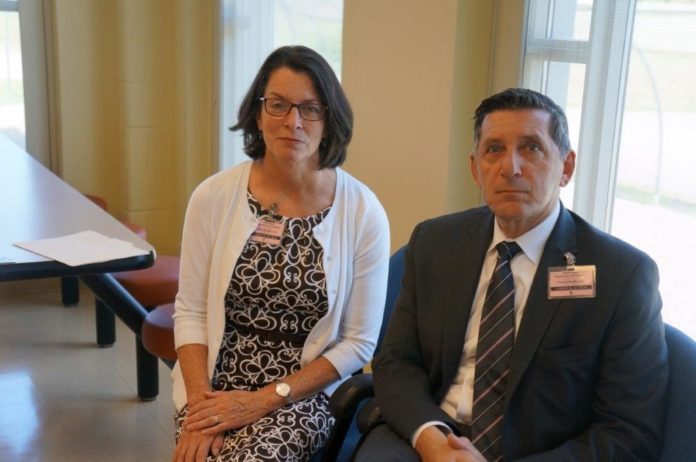
CRANSTON – “Congress needs to do its job” to ensure states get funding for programs like that offered to addicted inmates at the Adult Correctional Institutions, White House Director of National Drug Policy Michael Botticelli said at a July 26 press event held in a visiting room at the Adult Correctional Institutions’ Gloria McDonald women’s facility. Although President Barack Obama sought $1.1 billion in funding – $920 million of which would be directed to state programs – Congress hasn’t acted, said Botticelli, who is quite open about his story of recovery from alcohol addiction.
“Seventy-eight people die daily; there is no more important public health issue,” he said.
The ACI is expanding access to and choices of medication-assisted treatments to inmates at all of its facilities who suffer from opioid addictions, thanks to the $2 million allocated in the 2017 budget, less than Gov. Gina M. Raimondo’s $2.5 million request. Before this new program, which launched at the women’s facility in April, those who were addicted to illegal drugs or received methadone from a community-based clinic could continue to receive methadone, but only for seven days before going through withdrawal, with one exception. Treatment continued for inmates sentenced to no more than 60 days, said Dr. Jennifer Clarke, medical program director, Rhode Island Department of Corrections.
The DOC helps inmates connect with their preferred treatment – methadone, Suboxone (the trade name of buprenorphine/naloxone) or Vivitrol (the trade name of an injectable, long-lasting naltrexone) – in prison and in the community after they are released, said Clarke. Now, opioid-addicted inmates who enter the ACI on methadone maintenance or Suboxone treatment are maintained on medication for six to 12 months. Inmates who enter the ACI without medication are being screened, but not in a standardized fashion. As such, the DOC soon will use an evidence-based screening tool for correctional facilities that will improve identifying and assessing high-risk inmates, said Clarke. As of July 26, 57 inmates are using medication-assisted treatment, said J.R. Ventura, DOC’s chief information and public relations officer.
Botticelli added, “Rhode Island has been a leader in providing this life-saving treatment to incarcerated individuals to help them recover and successfully re-enter society. I hope more states adopt medication-assisted treatment in correctional facilities for those with opioid disorders.” A survey conducted by The Pew Charitable Trusts indicated that 12 states – including Rhode Island, Massachusetts, Vermont and Connecticut – currently offer these services to inmates.
Responding to this epidemic is a top priority for the Obama administration; good treatment and evidence-based medications can provide health and hope to those suffering with addictions, Botticelli said. “People who leave [prison] without medication-assisted treatment… experience a significant overdose risk, often within 72 hours. With treatment, there’s reduced recidivism, [it] enhances public safety and reduces cost to the public. Our office is looking to replicate these programs.”
Kerrie (whose last name was not used for privacy reasons) was one of four inmates at the women’s facility (which piloted the new program, as it had experience treating addicted pregnant inmates) who spoke at the media event held in a prison visiting room. She became addicted to pain medication after a car accident; those medications led to heroin, which she found cheaper and more accessible. In and out of the ACI more than once, Kerrie said that she’s overdosed no fewer than 10 times since 2010. “It’s embarrassing; that’s not how I was raised. I want to get clean and sober,” said Kerrie, who has five children ranging in age from 7 to 27, the eldest of whom is in prison. “I want to stay on medication and be a productive citizen. Addiction affects everyone – professionals, doctors. It’s a problem that we’ve been quiet about… I hope I get [recovery] this time.”
Although Medicaid funds can’t be used for people in prison, they can support former inmates who are in the community, said Rhode Island Secretary of the Executive Office of Health and Human Services Elizabeth Roberts. “Many people in prison are here for drug offenses and are addicted to drugs; they’re here so briefly. This new start provides them support.” An estimated 60 to 70 percent of the prison’s 3,000 inmates are eligible for Medicaid, said Ventura.
Botticelli believes physicians, many of whom need additional education on this issue, should be more thoughtful about prescribing opioids. While patients need to be treated appropriately for pain, “[over-prescribing] is a significant driver of the epidemic,” said Botticelli, noting that the federal government issued guidelines in March on opioid prescribing.
Introduced at 14 to heroin by her father, who prostituted her to support his heroin habit, Crystal turned to opiates to “stop me from feeling what I’ve been through.” A methadone user for 19 years, she has been in prison several times and lost her fiancé to a drug overdose. “I relapse every time I leave prison; it’s been hard. I hope [recovery] works this time,” said Crystal.
Applauding these inmates, Ashbel (A.T.) Wall, director of the Rhode Island Department of Corrections, said. “They are very brave to give you their names, tell you their stories and give a voice to what many others suffer in silence.”












